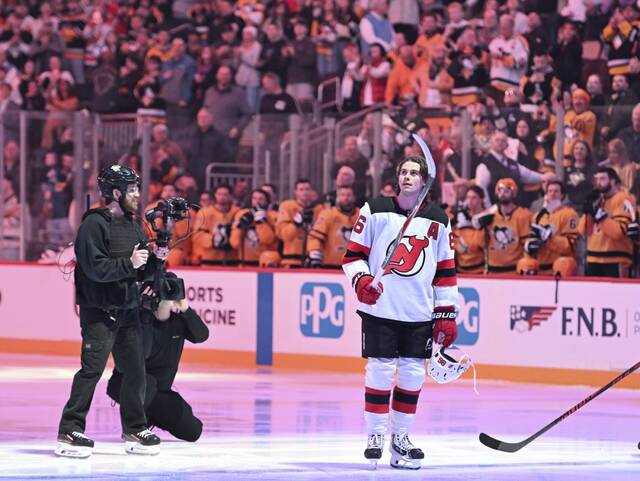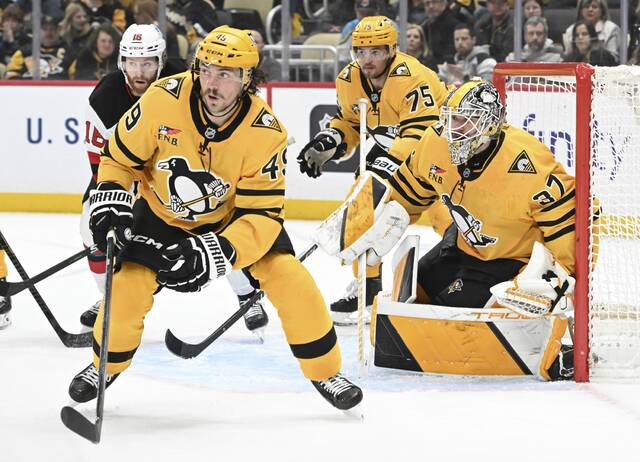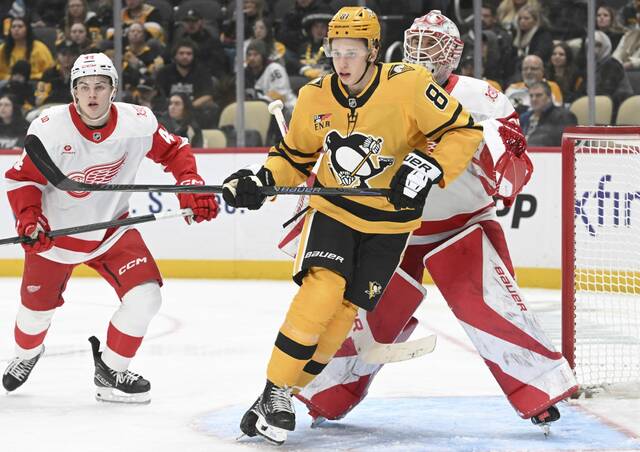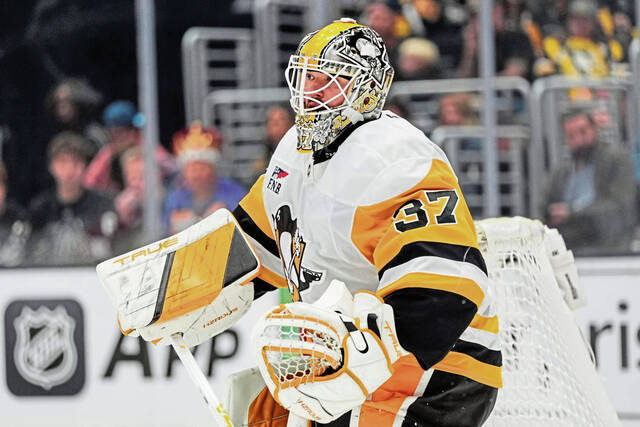The Pittsburgh Penguins do not yet have an answer for Carolina, given that they have dropped all three meetings this season against the Hurricanes, including Thursday’s 4-3 overtime loss at PPG Paints Arena.
Carolina previously edged the Penguins in overtime Nov. 29 and won 3-2 in regulation last Sunday in Raleigh, as well.
However, entering a four-day holiday break and with three games remaining before the calendar flips to 2023, the Penguins’ prognosis is largely positive.
In the rearview mirror is their ugly seven-game losing streak that lasted from Oct. 24 to Nov. 5 and featured shaky goaltending, an inability to preserve leads and feeble special teams play, with the power play lacking a punch and a less-than-robust penalty kill.
Since that rough stretch, the Penguins have rebounded to a 19-9-5 record and sit squarely in the NHL playoff picture, albeit with 49 regular-season contests left in tight Metropolitan Division and Eastern Conference races.
The Penguins have since managed win streaks of seven (Dec. 1-15) and five (Nov. 17-25) games to further wash away the sting of their early-season skid, which featured the most consecutive games lost by the club since early 2006, during Sidney Crosby’s rookie season.
As 2023 approaches, the Penguins mostly have been firing on all cylinders. Netminder Tristan Jarry has been among the NHL’s best dating to mid-November. He has earned points for the Penguins over 14 consecutive starts, which is tied with Marc-Andre Fleury for the second-longest such streak in franchise history.
And despite Thursday’s loss, the Penguins’ penalty kill neutralized all five of the Hurricanes’ power-play tries.
Having denied 84.8% of opposing man-advantages on the year, the Penguins’ penalty kill is second-best in the NHL behind Boston.
The power play also has found some rhythm of late, having notched goals in 10 consecutive games dating back to Dec. 1.
While goaltending and special teams have fluctuated in efficiency, one aspect of the team’s game that’s propelled it to a playoff-caliber club has been consistent even-strength scoring.
Earlier in December, the Penguins were second in the NHL in goals scored 5-on-5. Granted, they since have dropped off a touch in comparison to the rest of the league in that regard.
Look no further than Thursday evening for a recent example, as the Penguins managed just one 5-on-5 goal against the Hurricanes.
The Penguins’ 71 even-strength goals rank 13th, just outside the top third in the NHL and 10 goals behind first-place Seattle.
“We have a pretty structured gameplan that we try to stick to, and when we do it, it works,” defenseman Brian Dumoulin said. “We can hem teams in and get some chances off our forecheck, full ice transitioning off the rush. We’ve been doing it a lot of different ways, and we’ve got to continue it.”
Aside from a handful of isolated stretches this season, the Penguins have excelled at scoring even-strength goals.
No player across the league better exemplifies that than Crosby, whose 33 points (16 goals, 17 assists) at even strength are tied for the NHL lead with San Jose’s Erik Karlsson.
With 43 points, which also is a team-best, 77% of Crosby’s total points have come at even strength.
“He can create offense (in) different ways,” coach Mike Sullivan said. “He’s dangerous off the rush with his pure talent. I think his grind game is the best in the world, has been for a long time. There’s no better player underneath the hash marks or below the goal line.
“His ability to create offense in those areas — in the trenches, so to speak — he’s just so good at protecting pucks and he wears opponents down with his fitness level. He sees the ice so well. He’s just such a creative thinker.”
Similarly proficient in that regard is Crosby’s linemate, Jake Guentzel, whose 25 points at even strength are also among the NHL leaders (16th).
Earlier this season, when the Penguins’ power play ranked near the bottom of the NHL, some confusion lingered as to why the team was struggling so notably in man-advantage situations.
But, ultimately, whether players felt it on the ice on a nightly basis, the Penguins’ ability to get their goals 5-on-5 relieved pressure from the power play, which did not have to serve as an every-night scoring vehicle for the team.
“It (made) it feel like the power play should be doing better just because we (were) producing 5-on-5,” forward Bryan Rust said. “If they’ve got one less guy, we should essentially be able to build offense, too. … We’d, obviously, always like (the power play) to be going in the right direction, but our 5-on-5 game, 5-on-5 offense, has been good. It’s definitely helped.”








